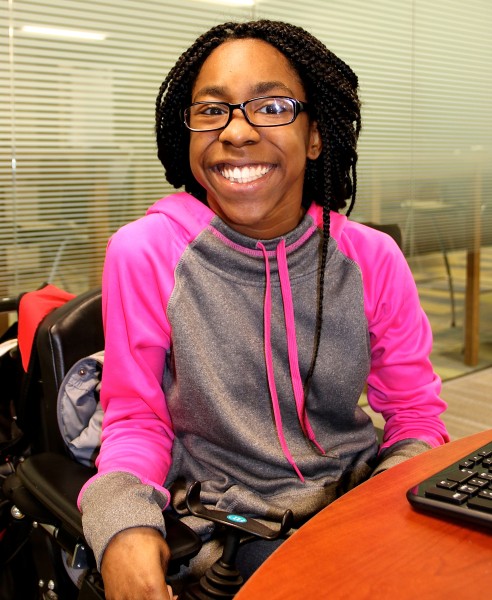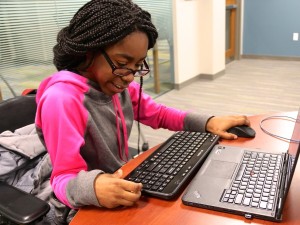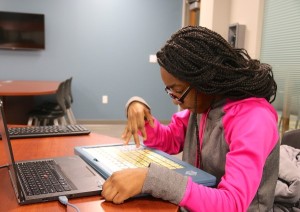
When I walked into the lobby at Ivy Tech Community College in Anderson, I was greeted by Cadira Greer and her notetaker. I was instantly excited to sit down and talk with Cadira when she greeted me with a great big smile. She has a warm personality that just radiates positivity.
I came to talk to Cadira to learn about the services she has received from Easter Seals Crossroads Assistive Technology department. Cadira started working with Easter Seals Crossroads when she was a senior in high school. She is now a freshman at Ivy Tech Community College in Anderson, IN.
Cadira has cerebral palsy. Cerebral palsy refers to to any number of neurological disorders. These disorders usually appear in infancy or early childhood and permanently affect body movement and muscle coordination. People with cerebral palsy typically lack muscle coordination when performing voluntary movements and also have stiff or tight muscles and exaggerated reflexes or spasticity.
Cadira told me she was born with cerebral palsy. Her cerebral palsy is moderate to severe. She has limited fine motor skills and has difficulty walking independently. She is able to ambulate with a walker, but mostly only walks for exercise. She relies primarily on a power wheelchair to get around.
Cadira told me that throughout school her biggest challenge was taking notes and tests. In 6th grade, she was appointed a notetaker. This notetaker stayed with her until she graduated high school. Cadira said this was so helpful and relieved her anxiety because she could focus on listening in class and not worry about trying to take notes. Once she was in high school, students started using more technology. Cadira was intimidated by the technology because it was tough for her to access a computer or tablet. She had a particularly tough time with touch screens as she has limited fine motor skills and the spasticity in her hands would cause her to hit icons that she had not intended to hit.
Cadira became involved with Vocational Rehabilitation her senior year to learn about what resources were available in transitioning out of high school. Vocational Rehabilitation is a state agency that offers assistance to people with disabilities in preparing for a job, obtaining employment, or even keeping their current job. Vocational Rehabilitation referred her to Easter Seals Crossroads for an assistive technology evaluation to determine what tools could help her throughout her senior year and assist her in transitioning to college. An assistive technology evaluation is a one-on-one evaluation to determine what technology is appropriate to meet a person’s needs in the home, work, school, or community.
Cadira worked with Brian Norton, who at the time was the manager of the  clinical department and is now the director of both the INDATA program and the clinical assistive technology program. Brian determined that Cadira’s biggest hurdle was computer access. He learned that Cadira’s greatest concerns were her ability to keep up with written assignments. He recommended several accommodations to address her access needs. He recommended that she have a laptop with several adaptive software programs. One of the programs he recommended was AudioNote. AudioNote is a note-taking application with a voice recorder. To increase her input speed, he recommended PhraseExpander software, which allows a user to use keyboard shortcuts to autofill often used
clinical department and is now the director of both the INDATA program and the clinical assistive technology program. Brian determined that Cadira’s biggest hurdle was computer access. He learned that Cadira’s greatest concerns were her ability to keep up with written assignments. He recommended several accommodations to address her access needs. He recommended that she have a laptop with several adaptive software programs. One of the programs he recommended was AudioNote. AudioNote is a note-taking application with a voice recorder. To increase her input speed, he recommended PhraseExpander software, which allows a user to use keyboard shortcuts to autofill often used phrases. He also recommended an IntelliKeys keyboard , which is a large key keyboard that is able to be customized for users who have a physical disability. This keyboard has larger buttons and can be customized to the individuals needs for better typing accuracy. He also recommended a large screen monitor, wireless mouse, and laptop stand for home to make doing homework more accessible.
phrases. He also recommended an IntelliKeys keyboard , which is a large key keyboard that is able to be customized for users who have a physical disability. This keyboard has larger buttons and can be customized to the individuals needs for better typing accuracy. He also recommended a large screen monitor, wireless mouse, and laptop stand for home to make doing homework more accessible.
When discussing her evaluation in high school, Cadira reminisced about how much she loved her high school years. She told me she was very active in high school. She was in the drama club and was on the cheer team. Cadira was in four different plays throughout high school. She told me the best part of drama club was “making so many friends.” She also told me she loved being on the cheer team. She said that the team was so supportive and did not care “if I could do flips or not.” She says she is enjoying college, but she misses all her activities. When I was talking with Cadira it was obvious that she is a social butterfly.
Cadira also told me that her favorite subject was always math. She is now taking classes at Ivy Tech in hopes to become an accountant. Cadira has been active in her church for the past 13 years and tells me that the accountant there may be retiring soon. She hopes that she may be able to work for the church as their accountant. She will be getting her associates degree in next few years. Cadira told me that she couldn’t do her school work without all the technology that Brian recommended and she is now using. In addition to the software Brian recommended, she uses a talking calculator to assist her in doing math. The talking calculator has larger buttons which are easier for her to push with better accuracy and the talking feature is helpful so she does not have trouble bending over to read the display.
Cadira is an honor roll student. She says with the help of her notetaker and assistive technology she is able to take 13 hours per semester. She told me that Brian was so helpful in finding the technology that allowed her to be able to do her school work independently. She said, “I couldn’t do my school work without it.” She went on to tell me, “I loved working with Brian. He doesn’t care when you call him. He always makes himself available any time even outside of office hours.”
I asked Cadira if she had any advice to share with people about assistive technology. She said, “If they haven’t worked with technology, it’s okay. Easter Seals Crossroads will train you so you will know how to do it by yourself.” She told me, “Technology is really fun when you understand how to use it.” She also advised that everyone using technology should “make sure to charge their technology every night.”
After talking with Cadira, I wished her continued success in school. I told her that I know she will be such a positive addition to a company’s accounting department one day not only with her great math skills, but with her positive can-do attitude. Cadira is great role model for how combining assistive technology, hard-work, and a positive attitude can help overcome physical challenges.
